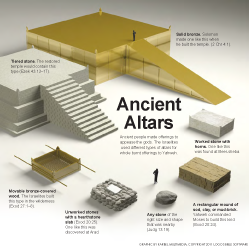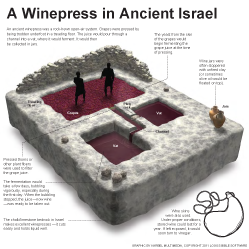14:1–5 In vv. 1–5, the Lamb is pictured standing with His 144,000 troops (see 7:4 and note) on Mount Zion. This passage answers the question of what happens to those who refuse the mark of the beast (13:16): They are marked with the name of the Lamb and His Father, and they are victorious. |
14:1 Mount Zion Zion originally referred to the Jebusite stronghold captured by David (2 Sam 5:6–7). It later came to symbolize the city of God, from which He exercises His reign (Isa 24:23; Heb 12:22).
originally referred to the Jebusite stronghold captured by David (2 Sam 5:6–7). It later came to symbolize the city of God, from which He exercises His reign (Isa 24:23; Heb 12:22).
one hundred forty-four thousand See Rev 7:4 and note.
written on their foreheads Deliberately contrasts the beast’s mark in 13:16–18 (compare 7:3; 9:4; 22:4).
14:2 a sound The Greek word used here can mean “sound” or “voice.” It refers to the song of the 144,000 (v. 3).
like the sound of loud thunder The other thunderous voice in Revelation followed the Lamb’s first initiation of judgment (see 6:1).
harpists playing on their harps Harps in Revelation often connote victory. It is later prophesied that Rome will no longer hear the sound of harps (18:22).
14:3 no one was able to learn the song It is likely a song praising God and the Lamb for redemption.
14:4 have not been defiled with women This is holy war imagery; it indicates those who are ritually clean according to the Mosaic laws governing holy war (Deut 23:9–10; see 1 Sam 21:5 and note; note on Josh 6:16; note on Josh 6:17).
for they are virgins Indicates that they have remained loyal to Christ and have not defiled themselves by compromising with the world (compare Rev 19:7–9; 2 Cor 11:2).
first fruits The offering of the firstfruits served as an acknowledgment to God for His gracious provision at harvest time (see Exod 23:16, 19). It communicated thankfulness and a sense of dependency from the person making the offering. It also signified that the entire harvest belonged to Yahweh. The people of God are presented in like manner.
served as an acknowledgment to God for His gracious provision at harvest time (see Exod 23:16, 19). It communicated thankfulness and a sense of dependency from the person making the offering. It also signified that the entire harvest belonged to Yahweh. The people of God are presented in like manner.
14:5 blameless Like their Lord; they reflect His character and fidelity.
14:6–13 Three angels arrive bearing announcements of impending judgment and a warning against religious compromise. There is a final exhortation to remain steadfast and an explanation of the consequences for those who do not. |
14:6 I saw Common language throughout the book indicating a new vision or a new scene in an existing vision.
flying directly overhead The last time this phrase was used (Rev 8:13), a threefold woe was announced—similar to what occurs here.
 Angels in the Bible Table
Angels in the Bible Table
eternal gospel His statement in v. 7.
14:7 Fear God and give him glory The goal of judgment (see 9:20 and note).
hour of his judgment has come Judgment is imminent. In light of the assembly of the Lamb’s troops in vv. 1–5, the angel can announce the arrival of judgment.
worship The angel calls his audience to worship the true God as opposed to the beast.
heaven and the earth and the sea and the springs All areas that God has judged so far.
14:8 Fallen, fallen Repeated for emphasis and to communicate the complete devastation that would befall Rome (see 18:2; compare Isa 21:9). John foresees the eventual demise of the city as judgment from God; it did not occur in his day.
Babylon the great Rome. Babylon, the site of the Tower of Babel and the destroyers of the Jerusalem temple (in 586 bc), was the symbol of human pride, idolatry, and immorality (e.g., Gen 11:9; Dan 4:30). Rome was guilty of the same sins that brought destruction on ancient Babylon (compare 1 Pet 5:13).
sexual immorality Probably refers to idolatry, often described as adultery in the ot, but sexual sins may be in view as well (compare Rev 2:14 and note; 18:3; Jer 51:7).
14:10 will drink They will be forced to drink; they will receive the wrath of God.
mixed full strength in the cup of his wrath It was unmixed—not weakened by diluting with water. For the cup of wrath imagery, see Jer 25:15–29.
with fire and sulphur Foreshadows the events of Rev 19:20; 20:10, 14–15. Sulfur is a foul-smelling element that burns extremely hot.
in the presence of They may be able to observe the joyous fates of those who chose to worship the Lamb rather than the beast.
14:11 forever and ever Unlike the torture of 9:5, which lasts five months, this final torture is permanent and will not be relieved.
14:12 patient endurance of the saints Refers to their perseverance in the pursuit of righteousness and faith. Like 13:10, this is an encouragement for believers but with a view toward eternal destiny: Those who persist in faith and do not take part in the worship of the beast will avoid the second death and receive divine blessing (see vv. 13; 20:12–15).
14:13 Write See 1:11, 19; 2:1, 8, 12, 18; 3:1, 7, 14; 19:9; 21:5. This has been John’s command from the beginning of the book.
Blessed are A second beatitude (see 1:3 and note).
in the Lord In union or relationship with the Lord.
from now on John anticipates several martyrdoms in the near future.
“Yes,” says the Spirit The first time the Spirit speaks explicitly in the book.
for their deeds follow after them Describes a record of their service and faithfulness to Christ. This section (vv. 6–13) is an exhortation to believers to avoid compromise with the world and the beast and to persevere until death. In the end, their deeds will testify to their faith.
14:14–20 This section narrates two harvests: a grain harvest and a grape harvest. The first harvest is performed by the Son of Man, the second by an angel. It is not entirely clear whether these harvests indicate salvation or judgment. The first harvest appears to be a harvest of salvation, and the second harvest appears to be a harvest of judgment. |
14:14 a son of man See 1:13 and note.
golden crown Testifies to Jesus’ kingship (compare 4:10).
sickle A tool with a curved blade and handle used for reaping grain.
with a curved blade and handle used for reaping grain.
14:15 another angel In addition to the three mentioned in vv. 6–9.
 Angels in the Bible Table
Angels in the Bible Table
the temple Refers to the temple in heaven (see 11:19 and note; v. 17).
the one seated on the cloud Refers to Christ; the angel informs Christ of God’s command to reap.
the harvest of the earth is ripe The imagery in this section may echo Joel 3:12–13 or Jesus’ words about the end-time harvest (Matt 9:37–38; 13:36–43). If the Joel passage is in view, this may be a judgment on the wicked. If Jesus’ words are in view, this first harvest consists of collecting those who will be with Him.
14:17 he also had a sharp sickle Christ performed the first harvest; the grape harvest will be performed by angels (compare Matt 13:41–42).
14:18 authority over the fire While this could be suggestive of judgment, like the angels who control the water and wind, it most likely refers to the fire of the altar (Rev 8:3–5; compare 7:1; 14:10; 16:5).
from the altar The altar is in the temple (vv. 15, 17). The mention of the altar might suggest the atonement God requires (5:12).
is in the temple (vv. 15, 17). The mention of the altar might suggest the atonement God requires (5:12).
14:19 the great winepress of the wrath of God This reaping involves not just harvesting, but crushing in a winepress (compare Isa 63:3; Rev 19:15).
Artifact Winepress A winepress extracts juice from grapes. It was a large, enclosed stone structure into which baskets of grapes were poured. Workers stood inside the winepress and trampled the grapes as they were added. The juice from the clusters flowed out of the winepress through a channel cut into the wall and into a vat or bucket placed beneath the structure. John uses this image to vividly portray the fate of unbelievers: They will be trampled underfoot like grapes in a winepress, and their blood will flow profusely. |
14:20 outside the city Criminals and the wicked were customarily executed outside the city.
bridles of the horses The blood was about five feet deep.
one thousand six hundred stadia This expression, combined with “as high as a horse’s bridle,” is meant to suggest a great quantity of blood and a massive number of people judged.

|
About Faithlife Study BibleFaithlife Study Bible (FSB) is your guide to the ancient world of the Old and New Testaments, with study notes and articles that draw from a wide range of academic research. FSB helps you learn how to think about interpretation methods and issues so that you can gain a deeper understanding of the text. |
| Copyright |
Copyright 2012 Logos Bible Software. |
| Support Info | fsb |
 Loading…
Loading…



